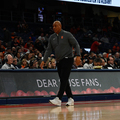Girshon: The NCAA’s ‘system’ is to blame for Trebor Peña’s transfer

Our columnist writes wide receiver Trebor Peña's shocking departure should be blamed on the NCAA's lack of a system. Leonardo Eriman | Asst. Video Editor
Get the latest Syracuse news delivered right to your inbox. Subscribe to our sports newsletter here.
Trebor Peña bailing on Syracuse, presumably for an increase in name, image and likeness money, is the epitome of “don’t hate the player, hate the game.” For better and worse, NIL and the transfer portal’s emergence have led to college football becoming the Wild West. While they play a large role in college football’s problems, they aren’t the root cause.
Instead, it’s an unregulated marketplace.
In the NFL, a team’s representatives can’t negotiate with players and coaches under contract or their representatives because of tampering penalties. In 2019, the Miami Dolphins notoriously tampered with Tom Brady and then-New Orleans Saints head coach Sean Payton. Owner Stephen Ross was issued a $1.5 million fine and a suspension, a $500,000 fine was handed to vice chairman/limited partner Bruce Beal and the organization lost its 2023 first-round pick and 2024 third-round pick.
While tampering penalties deter NFL teams, nothing stops college programs. Whoever lures Peña to their program, with Miami an early frontrunner, will be the latest example of why. The wide receiver totaled a career-high 84 receptions, 941 receiving yards and 10 total touchdowns in 2024, resulting in a Second Team All-Atlantic Coast Conference selection.
Outside of NIL, where he reportedly was going to be well-compensated by SU, Peña had no reason to enter the portal. He would’ve been newly anointed starting quarterback Rickie Collins’ go-to option after Oronde Gadsden II and Jackson Meeks’ departures. Head coach Fran Brown named him a captain. Syracuse stuck with him through numerous injuries since his freshman season in 2020 before his breakout 2024 campaign. And he participated in the Orange’s entire spring training camp and game.
But in college football’s current state, the name on the front of the jersey means nothing. It’s all about the name on the back. And despite how much SU has given to Peña, he can’t forgo a possibly life-changing financial opportunity in potentially his last year of eligibility. It’s why his transfer makes sense, even if it was surprising.
Nonetheless, the situation sucks for everyone. Syracuse loses arguably its most important offensive threat and locker room piece, while Peña was forced to make a life-changing decision that entailed leaving the program that got him where he is.
And it’s all the NCAA’s fault.
While the NCAA has allowed athletes to be compensated through NIL since July 2021, it’s refused to admit they’re employees. It’s to keep the “student-athlete” mantra alive, when in reality, they’re increasingly becoming professionals.
The main thing preventing college athletes from earning that title is the lack of a collective bargaining agreement, which could come to fruition depending on how the ongoing House vs. NCAA settlement — a $2.8 billion federal class-action antitrust lawsuit filed by athletes against the NCAA and power conferences — shakes out.
If the settlement is approved, programs can directly pay its players up to roughly $20.5 million per year. Hence, athletes could become employees. But that’s not the case right now.
Instead, it’s collectives, like Syracuse’s SU Football NIL and Orange United, funded by prominent alumni and boosters, that are paying athletes. And there’s no way to contain the madness that comes with them, which has been put on full blast from the start of quarterback Nico Iamaleava’s tenure at Tennessee to his recent abrupt ending.

Syracuse wide receiver Trebor Peña scores a touchdown in its win over Washington State in the Holiday Bowl. Despite Peña being named as a captain for the upcoming season, he entered the transfer portal Tuesday. Leonardo Eriman | Asst. Video Editor
Unlike professional sports leagues, the NCAA doesn’t have a commissioner overseeing Division I athletics. Each conference has a commissioner responsible for its select teams; the ACC’s is Jim Phillips. These commissioners aim to do what’s best for their leagues but don’t have the power to govern the NCAA as a whole.
Without a collective bargaining agreement or commissioner, which would solidify its professionalization, college football’s marketplace doesn’t have rules besides when a player can enter the portal and when it closes. Negotiations are forever ongoing, no matter a player’s enrollment status.
In cases like former UNLV quarterback Matthew Sluka, that doesn’t even guarantee a player receives what they agreed to be compensated for. In other cases like Peña’s, it means outside schools can tamper despite a player already having an agreement.
It’s madness. But it’s a madness Brown showed he was built for in his first year as the Orange’s head coach. Despite not being in elite NIL standing, which SU Director of Athletics John Wildhack said on Saturday has since “made progress” but isn’t “where we want to be yet,” Brown brought in star transfers Kyle McCord and Fadil Diggs to help set a new standard at SU.
Brown didn’t experience the portal’s downside until Peña’s surprise exit. The program gave its all to Peña, handing him his only Power Four offer out of high school. Throughout his first three years with the program, he was a gadget offensive player and primarily made a name for himself as a punt and kick returner.
After emerging as a receiving option in 2022, tallying 203 yards, Peña couldn’t build off that in 2023 due to suffering an injury in the season opener. But with a new coaching staff, quarterback and a clean bill of health, everything clicked in 2024.
It’s why, at an SU Football NIL event in December, Brown named him a 2025 team captain in front of boosters. The distinction was likely to garner support for Peña and his teammates to earn better compensation from donors and help Brown solidify SU as a perennial nationally ranked program after a season it proved it was back.
It was the ultimate feel-good story, and it should’ve set the stage for Peña’s continued success at Syracuse. He was supposed to become the top guy on SU’s offense and help lead it to another bowl game win.
Instead, his last time donning a Syracuse jersey came during its final spring practice on Monday. And it ended with a nearly hour-long discussion with members of its leadership council after practice ended.
It shouldn’t have ended like that. It’s unfair for everyone. But because college football has no rules or governance, it’s a reality Syracuse will face head-on.
Justin Girshon is the Sports Editor at The Daily Orange, where his column appears occasionally. He can be reached at justingirshon@gmail.com or on X @JustinGirshon.






